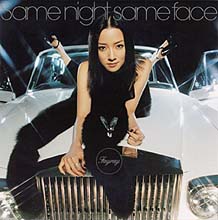This article needs additional citations for verification .(June 2025) |
| "Same night, same face" | ||||
|---|---|---|---|---|
 | ||||
| Single by Fayray | ||||
| from the album CRAVING | ||||
| Released | October 14, 1999 | |||
| Genre | J-Pop | |||
| Length | 13:51 | |||
| Label | Antinos Records | |||
| Songwriter(s) | Akio Inoue, Daisuke Asakura | |||
| Fayray singles chronology | ||||
| ||||
"Same night, same face" is Fayray's 5th single and first re-cut single. IThe song was used as the image song for the PlayStation Gamesoft "ZILL O'LL" as well as the ending theme for the ABC/TV Asahi series program "Ninkimono de Ikou!". "No, never" was used as the ending theme for the Fuji TV program "Uhhhya~!! Hanasaka London Boots". "Sono Ai no Katachi (Pieces of that love)" was used as the ending theme for the WOWOW program "Tokyo LONBOO Tower".